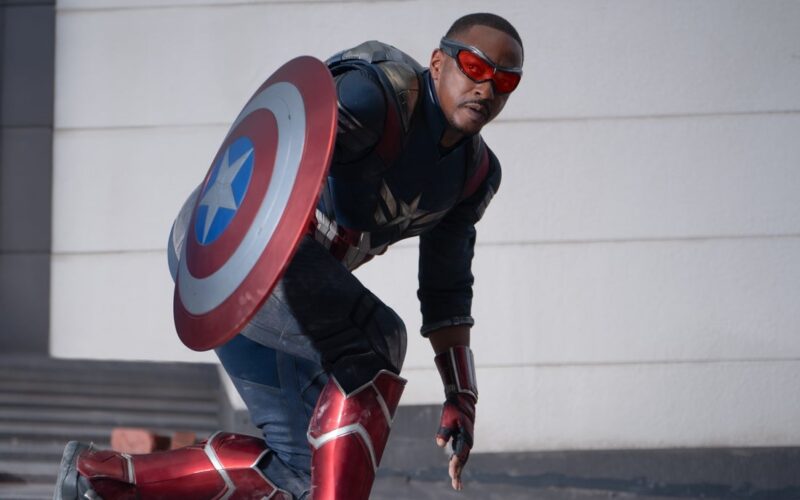Captain America: Brave New World (Onah, 2025)
The false flag in the new Captain America film turns out to be the word “Brave.” It is as safe and nondescript as a film about a mentally unhinged American president who is criminally abusing his office can be. It’s about as white bread as the story of a Black soldier with reservations about being the symbol of an America that has never owned up to or taken accountability for past sins can be.
In other words, you get a good forty minutes of “Smash!…Boom!…Pow” sprinkled around two hours of allusions to a geopolitical landscape that the film is ultimately uninterested in or unwilling to explore. Don’t get me wrong, world-building has never been a particular strength of the MCU. Cross-cameos and quick allusions to things that happened (or will happen) in other movies are fine marketing tools to keep the titanic franchise moving forward, but they don’t fundamentally impact any current story narrative, except as plot devices. Consequently, we find out the Celestial Island created at the end of The Eternals will be the source of “Adamantium” (hmmmm, where have I heard that word before?) and that General Thaddeus Ross (Harrison Ford) shaved his mustache when he decided to run for president.
But exposition is not character development, and the potential places where the story could gain emotional weight are glossed over perfunctorily. We learn/are reminded, for example, that Sam Wilson (Anthony Mackie) has rejected the idea of taking the super soldier serum that gave Captain America his powers. In that decision alone there could be an entire theme of a movie: how is Sam different in kind rather than iteration from Steve Rogers? Instead, we get a throwaway line about accepting a super-suit from “the Wakandans” and some weak, generic speeches about how new generations never live up to their iconic predecessors.
Speaking of the Wakandans, what does Sam’s decision to accept their technology but not the United States’ say about his independent operator status? Sam did side with Steve Rogers after the Sakovia Accords –and get imprisoned by the government he had served all his life — didn’t he? Yet when the patterns of the past are repeated in the present with Isaiah Bradley, the extent of Sam’s conflict is reduced to one of personal friendship rather than being informed by deeper concerns for justice or about corruption.
All of this leads to a conclusion that is unsatisfying both as a plot resolution and as a thematic one. There’s some gobbledegook at the end about personal responsibility and accountability, but the film bends over backward to insist that Ross is compromised rather than corrupt. At heart, he is a good dude who loves his daughter–secret, off-the-books detention centers notwithstanding–and Sam shows his true patriotism by believing in America rather than by upholding its ideals.
Of course, one could argue that by introducing Adamantium, the MCU is setting up to bring in the X-Men via the Weapon-X storyline, which is itself a deeply distrustful take on institutional power and the horrors that those who wield it can inflict on others and rationalize to themselves. If that is the direction the next “phase” is going, I don’t see much here that gives me hope that the MCU is equipped to or interested in dealing with moral complexity.
And yet, Anthony Mackie is so immensely talented that he almost manages to pull this off. In a speech to the new Falcon late in the film where Sam discusses the weight of never being “enough,” we see hints of the anger and frustration that the film mostly won’t let him show elsewhere. If I were convinced it was there but repressed by necessity, I would probably give the film a pass for missed opportunities. But Sam as written is just so…bland. This is the eighth (I think) MCU project that Sam has been in, and I already feel like I have a deeper understanding and appreciation for Terry Richmond after one Rebel Ridge movie. I wanted to love this movie because I think that the conflicts, internal and external, that Sam faces are in many ways more interesting and dramatic than those of just about any other current MCU character. He’s one of the very few MCU characters who has a civilian character and identity as rich and interesting as his hero persona. And the film just doesn’t do him justice.

